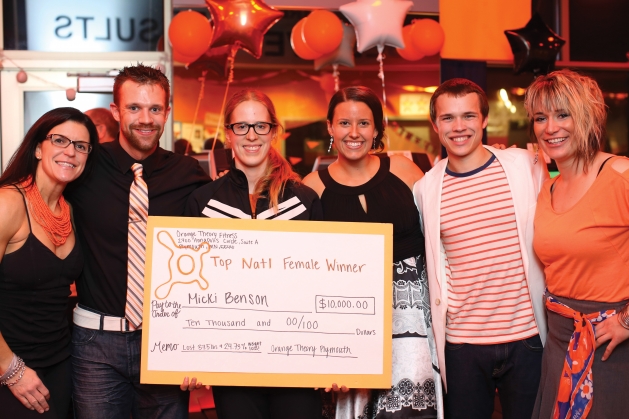
Micki Benson has never been the type of gal to back down from a challenge. Intensely driven and fiercely competitive, the 26-year-old hardly gave a second thought to entering Orangetheory Fitness’s weight-loss competition early this year.
“I said, ‘You know what? I have weight, I have the opportunity to possibly win this; I’m going to go for it,’” she recalls.
The nationally hosted six-week contest was held January 20–February 28. All 67 of Orangetheory Fitness’s studios participated (more studios have since opened), attracting a whopping 3,700 participants nationwide. At Plymouth’s Orangetheory location alone, nearly 150 people signed up.
The premise of the competition was simple: Healthily lose as much weight as you can in the time provided. The winners—one male and one female—would each receive $10,000.
“To ‘healthily lose weight’ means using a combination of diet and exercise, and not doing anything too extreme in the sense of not working out for four hours a day, not severely cutting your calories to fewer than 1,000 a day,” Plymouth Orangetheory head trainer Kristy Gess says.
The money was certainly a motivator for Benson: “I asked one of the trainers, ‘Is it really that much?’” she recalls.
It was.
When thinking of a national weight-loss champion, many people tend to assume the competitors are like those seen on the reality TV show The Biggest Loser: extremely overweight and inactive. While some of Orangtheory’s participants might have fit that mold, Benson certainly did not.
A self-proclaimed fitness enthusiast, Benson grew up surrounded by active family and friends. “Growing up I was always into sports,” she says. “Softball, tennis, soccer … basketball.” Three and a half years ago, she decided to add “serious runner” to her sports and exercise repertoire; it wasn’t long before she was finishing marathons.
A year and a half ago she introduced Orangetheory Fitness into her impressively fit, albeit hectic, schedule (Benson’s full-time job is as a channel marketing specialist and designer for Resonix, LLC in Chanhassen). The exercise studio chain, which has Minnesota locations in Plymouth, Minneapolis, Maple Grove and Apple Valley, combines interval cardio exercises with circuit-based strength training—a workout design that hooked Benson almost immediately: “I love interval training on the treadmill,” she says.
Trainers at Orangetheory were quick to pick up on Benson’s motivation and drive. “She is always up for a challenge,” Gess says. “She’s the type of person where, when you’re showing the class a workout with beginner, intermediate or advanced options, she’s always going to go for the advanced.”
According to Gess, Benson’s thirst for a challenge has brought her to many of Orangetheory’s fitness competitions. Whether it’s been the number of pushups completed in one minute or a dry triathlon, Benson is usually present and almost always a—if not the—top finisher.
The goals for this competition were results-driven. “That’s our whole basis for what we do,” Gess says. “We really believe that when people see results, they’re really going to stick with the program. A part of this includes people understanding what their goals even are. We offer an initial goals counseling session, and this competition served as a checkpoint for people’s previously set goals.” Many Orangetheory members in Plymouth also like the accountability that’s attributed to a competition like this, she says: “There’s that sense of not wanting to let yourself or your trainer down for not seeing progress each week.”
Given this penchant for competition, her self-motivated nature and the enticing cash prize, it’s no surprise that Benson signed up for the national weight-loss competition. As a contestant she had to follow the few established rules: Attend at least three Orangetheory classes a week, participate in weekly weigh-ins, and take a beginning-, mid- and final-photo. Each contestant was matched with a trainer to help them track their progress, though they were able to work out with any trainer throughout the course of the challenge. Benson was matched with trainer Sam Haley, with whom she had taken classes several times prior to signing up for the challenge.
And so it began.
At her initial weigh in, Benson, who stands 5 feet 9 inches, hit the scales at 152.6 pounds. According to the National Institutes of Health, this height/weight combo placed Benson at a 22.5 Body Mass Index—solidly within the healthy weight range for a woman her age. Both Benson and Gess acknowledge that Benson was by no means overweight at the beginning of the challenge. Consequently, there was vigilant planning and oversight to ensure that all weight was lost in a healthy manner. Benson worked with her trainers as well as a nutritionist throughout the challenge.
“We really encouraged her to take it easy, watch it and make sure that she was still eating enough protein and healthy fat so she wasn’t compromising her health and her exercise performance,” Gess says.
Throughout the challenge, Benson adhered to a strict training schedule designed to help her prepare for an upcoming marathon. With running as her main focus, she also dedicated time to speed work, biking and, in adherence to the competition rules, Orangetheory classes. She averaged two hours of exercise a day, though sometimes reached up to three on the days she attended a class.
For her diet, Benson’s staples were vegetables and lean meats, with occasional carbohydrate treats to keep her metabolism up (Clif Bars, she says, were her favorite). Nutrition coach Dan Krueger monitored her intake and output closely. Benson notes she kept her intake to about 1,400 calories a day during the challenge, more on days she had heavy workouts. “We introduced high carb/high calorie days on a weekly basis to provide the body a catalyst to increase the metabolism and increase the rate of fat loss,” Krueger says.
Benson checked in with her nutrition coach daily to go over what and when she was eating to make sure she was staying on track—to maintain her metabolism, she ate a minimum of eight small meals a day, about once every two to three hours. “Micki was consuming food from the moment she woke up until right before she went to bed,” Krueger says.
“This challenge taught me a lot about food,” Benson says. “You need to eat a lot less than what you’re burning if you want to lose weight [about 3,600 calories out versus in per pound lost].”
Citing the time-consuming nature of her workouts, Benson says meal planning and preparation was one of the biggest challenges she faced. And alongside food prep, she struggled with sleep deprivation. In order to fit the long workouts into her already packed schedule, Benson often found herself waking up at 3 or 4 a.m. Combined with her low-calorie diet, her energy supply waned, especially by the end of the challenge. To combat this, Krueger helped identify a micro-nutrient profile for Benson—vitamins, antioxidants and minerals—ensuring those dietary needs were fully met with foods that have a low caloric value.
“Food is your body’s primary source of energy,” he says, “so when competing in a weight-loss challenge, you are eliminating the body’s energy source … but you can maintain good health as long as your micro-nutrient needs are met while dieting. This is done with whole food sources (fruits and veggies) and supplementation. Most dieters don’t make micro-nutrient needs a priority, and this is unhealthy.”
Despite the challenges, Benson stuck to her routine and started seeing some pretty incredible results.
“I lost 10 percent [of my total body weight] the first week of the diet, which was crazy,” Benson says. “I kind of looked at the scale and thought, ‘That can’t be right,’ because that was 15 pounds I lost in a week.”
After six weeks, it was time for the final weigh in. Collectively, the Plymouth Orangetheory studio lost almost 600 pounds. At a final weight of 114.1 pounds, Benson contributed 38.5 pounds to that total—an incredible 25.2 percent of her original body weight. “Throughout we made Micki’s wellbeing a priority,” Krueger says. “It is not necessary to starve yourself to see rapid weight-loss results, contrary to what many people believe.”
It didn’t take long to discover that Benson’s impressive loss made her the biggest loser, out of both men and women, in the nation. In one humble word, Benson described the feeling as “awesome.”
“We had a big weight-loss challenge party at our studio on March 14,” Gess says. “We catered in healthy food, games, a professional photographer and a photo booth” to celebrate both the studio’s and Benson’s success.
Since the end of the challenge, the always bustling Benson hasn’t stopped to rest. Immediately after her success, she jumped right back into a high-carb diet to get her ready for her next marathon—which boosted her back to a healthy 135 pounds.
Some people might question these extreme fluctuations in weight, suggesting this isn’t really “healthy weight-loss.” Certainly, a 5-foot 9-inch frame at 135 is perfectly svelte, so maintaining that weigh, still 15 pounds lighter, isn’t concerning to most fitness pros. Gess suggests the real success story here is more about educating oneself about the science of food and weight, calories in versus calories out.
“Sometimes you do things that are sustainable versus attainable,” Gess says. “You can attain certain fitness levels, but they’re not sustainable. Eating and exercising like [what Micki did] is pretty tough; it’ll put a damper on your social life. You’re not going out to eat; you can’t have sugar. You learn what your body is capable of … [Micki] learned what her body is capable of—she learned different healthful recipes and ways to eat and foods she can eat—these are all skills that will stick with her. She probably also learned where her body is happier. She’s back to trying to live and be social and not have so many restrictions on how she’s eating and living.”
Indeed, Benson’s next goal is qualifying for the Boston Marathon. To do this, she’s been running a variety of races, including a self-designed “birthday marathon,” Grandma’s Marathon in Duluth and this month’s Chicago Marathon. Personal trainer Luis Leonardo from Steele Fitness in Edina is helping her with her running goals. She’s also toying with the idea of an Ironman triathlon.
“Races kind of keep me on track, as far as my own fitness. If I weren’t training for anything, I’d be doing my own runs,” Benson says. “I just enjoy running, it makes me happy. It’s kind of my therapy.”
As for the prize money? Benson’s played it smart, dedicating half of it to her savings and paying off some bills. She’s making sure to reward herself, too—this fall she’s heading to Barcelona to visit her sister.
Want to Challenge Yourself?
Orangetheory hosts fall fitness events.
Healthy Living Challenge
September 15–October 15
Work with Orangetheory pros to create a holistic plan for healthy living, including diet, exercise and more. Challenge participants work during the 30-day period to meet wellness goals.
Hell Week
October 20¬–24
This intense, week-long challenge focuses on muscle-building workouts. Participants must attend at least five out of seven available muscle-work classes during the week.
For more information or to sign up, contact Orangetheory:
Orangetheory Fitness
2700 Annapolis Circle, Suite A
763.300.3447









